孟晚舟包机上感言:中国红照亮至暗时刻
9/25/2021

华为首席财务官孟晚舟当地时间9月24日与美国司法部门达成延期起诉协议后,已乘坐中国政府包机航班CA552从温哥华起飞,今晚抵达深圳。中国官媒央视新闻客户端刚刊登了孟晚舟在包机上发布的感言。
孟晚舟说:“没有强大的祖国,就没有我今天的自由”,孟晚舟记述了她在加拿大1028天中的诸多苦恼,并称“正是那一抹绚丽的中国红,燃起我心中的信念之火,照亮我人生的至暗时刻,引领我回家的漫长路途。”
孟晚舟在中国政府包机上发布的感言全文:
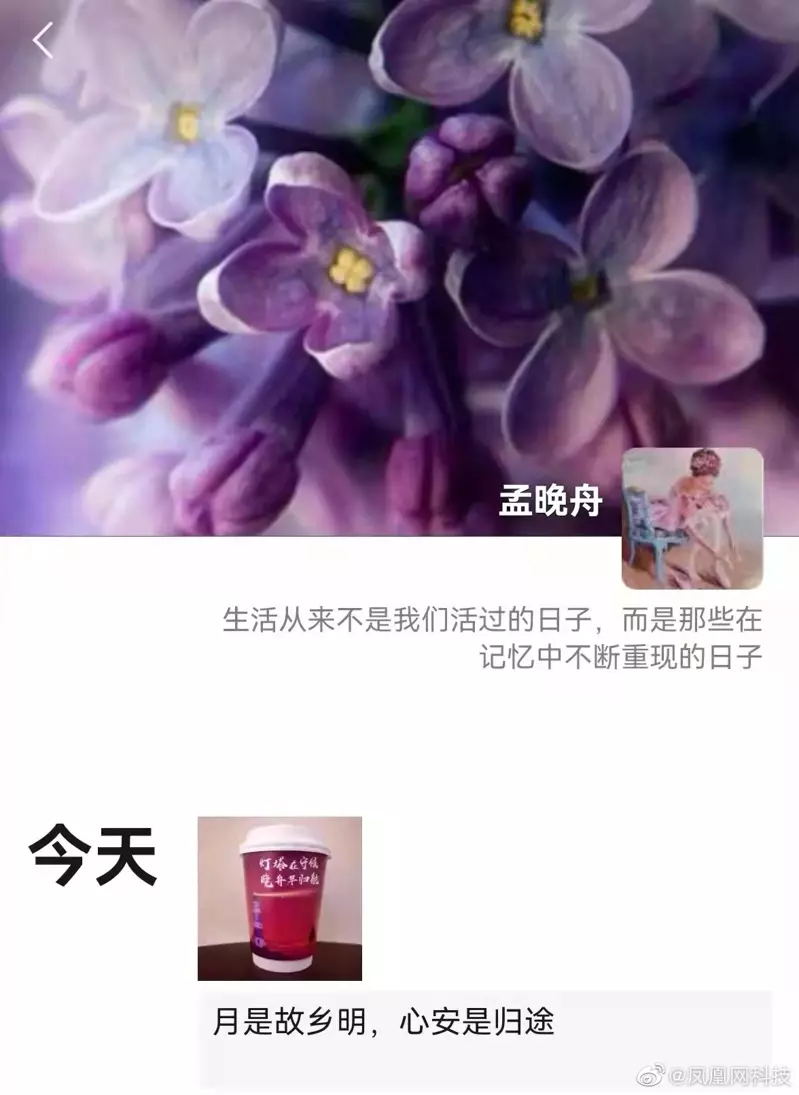
月是故乡明,心安是归途
舷窗外一片漆黑,机翼上的航行灯闪烁不停,在寂静的夜空中,这些许的微光显得格外温暖。
此刻,我正飞越北极上空,向着家的方向前行,马上就要投入伟大祖国母亲的怀抱,阔别三年的祖国已在天涯咫尺。近乡情更怯,不觉间泪水已模糊了双眼。在中国共产党的领导下,我们的祖国正在走向繁荣昌盛,没有强大的祖国,就没有我今天的自由。
往事一幕幕闪过,恍若隔世,却又历历在目。过去的1028天,左右踟躇,千头万绪难抉择;过去的1028天,日夜徘徊,纵有万语难言说;过去的1028天,山重水复,不知归途在何处。“没有在深夜痛哭过的人,不足以谈人生”,一次次坠入深渊,又一次次闯入暗夜,曾让我辗转难眠,更让我刻骨铭心。泪水抱怨化解不了愁苦,伤春悲秋翻越不过泥泞,与其困顿挣扎,不如心向阳光,冲出阴霾。有些风浪,难免艰险,唯有直面才能扬帆远航;有些抵达,难免迂回,历尽波折终会停泊靠岸。无数次奔跑,无数次跌倒,唯有此次让我倍感坚强;无数次出发,无数次归家,唯有此次让我热泪盈眶。万家灯火总有一盏给我温暖,浩瀚星河总有一予我希望,感动于心,感激于情。
我们祈祷和平,幸运的是,我们生在一个和平的时代;我们崇尚伟大,可贵的是,我们生在一个伟大的国家。成长在改革开放时期的我,亲眼目睹、亲身经历了共产党领导下的中国和中国人民是如此伟大,全体同胞数十年如一日地艰苦奋斗,让我们的祖国走向繁荣富强,人民迈向共同富裕,为世界的和平与发展做出巨大的贡献。
感谢亲爱的祖国,感谢党和政府,正是那一抹绚丽的中国红,燃起我心中的信念之火,照亮我人生的至暗时刻,引领我回家的漫长路途。感谢亲爱的家人们,与我一起经历风雨,见证岁月,安放我所有的喜乐苦悲。是你们的遥遥相伴,陪我越过层层山丘;是你们的默默守护,带我跨出丛丛荆棘。感谢亲爱的伙伴们,有一种浪漫叫并肩作战,有一种纯粹叫全力以赴,有一种果敢叫奋不顾身,回首此间,满是静水流深的情义和雷霆万钧的担当。感谢亲爱的同事们,虽然分别已久,你们的真挚鼓励和持续坚守,让我们始终风雨同舟,艰难征程波澜壮阔,赤诚初心历久弥坚。感谢所有关心我的你和你们,就算素未谋面,你们的浓浓情意、切切问候和深深祝福,如一道彩虹,斑斓了坎坷路途上的一隅天空。
午夜梦回,最是心底那一轮明月,那一江春水,那一缕乡愁,亦是我滞留他乡三年每分每秒的心灵归宿。秋风掠过,登机前,温哥华已需寒衣加身。此时,祖国的秋日正是天朗气清、暖阳和煦,期待一年好景致,再赏橙黄橘绿时。祝愿祖国母亲生日快乐!
回家的路,虽曲折起伏,却是世间最暖的归途。
Meng Wanzhou returning to China
CGTN
9/25/2021
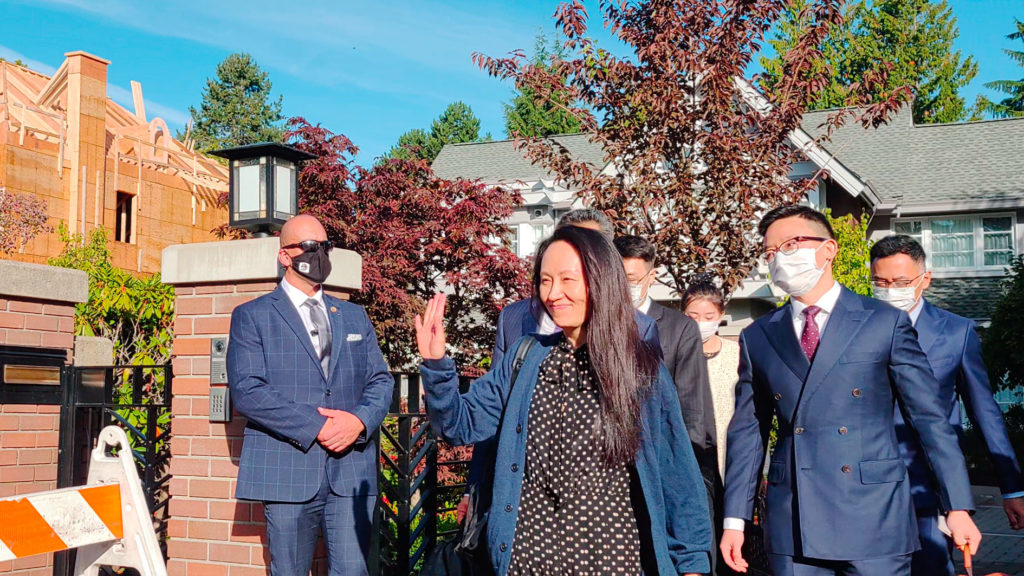
Through unremitting efforts of the Chinese government, Ms Meng Wanzhou has already left Canada, on September 24 local time, on a charter flight arranged by the Chinese government. She will soon return to her home country and reunite with her family.
Meng’s house arrest in Canada ended on Friday after the U.S. Department of Justice dropped its request for her extradition.
She was arrested in 2018 at Vancouver International Airport at the request of the United States.
(With input from Xinhua)
孟晚舟获释, 发表演讲: 感谢祖国和人民的支持
文章来源: 凤凰网
9/24/2021
孟晚舟获释后发表简短演讲,在演讲的最后,她说:“我想感谢我的祖国和祖国人民对我的支持和帮助,这是我走到今天最大的支柱!
Sep 24, 2021
温哥华当地时间 9 月 24 日下午三点,孟晚舟和他的保安团队,另外还有中国驻温哥华总领馆的代表,总共 7 辆车陆续抵达了温哥华国际机场货物进出的进出口。因为孟晚舟事件得到了国际性的非常大的关注,温哥华国际机场方面开通了一个特别通道,给她从货物出口进出放行,以免有一些不希望发生的事情发生,也避免了造成人群的聚集。
与美司法部达成协议 孟晚舟获释
9/24/2021
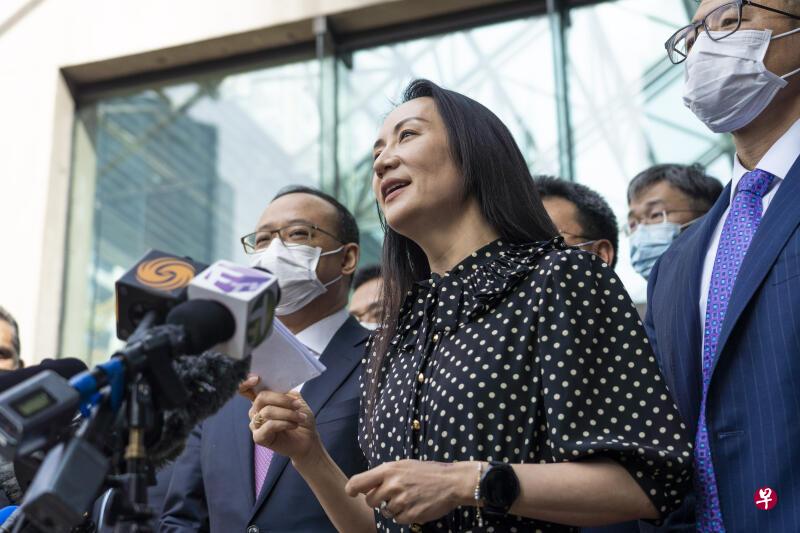
中国华为公司首席财务官孟晚舟引渡案出现突破性进展。一名加拿大法官当地时间周五(24日)签署了孟晚舟的释放令,取消保释条件,在近三年的居家监禁后,孟晚舟终于获准返回中国。
综合路透社、法新社、南华早报报道,此前,美国司法部周五称,已与孟晚舟达成暂缓起诉协议。
暂缓起诉协议将有效到明年12月1日,释放孟晚舟的条件是她同意对案件进行“事实陈述”。
在加拿大温哥华通过视像方式出席美国纽约联邦法院的聆讯时,孟晚舟并未认罪,但作为协议的一部分,她承认提供了“明知虚假的陈述”。
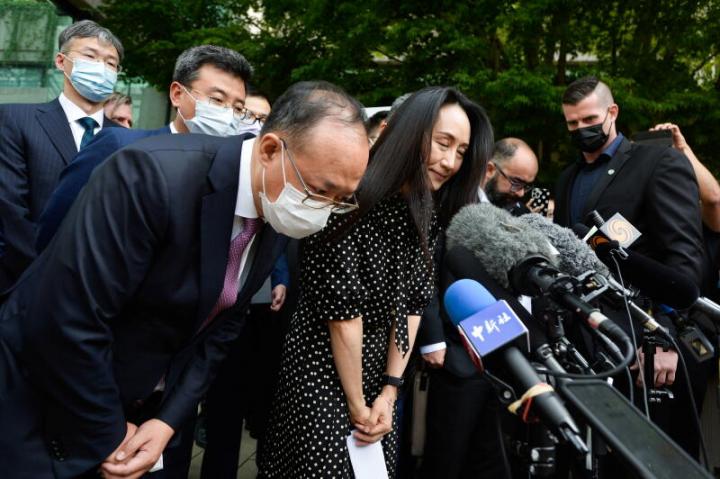
美国助理检察官大卫·凯斯勒(David Kessler)在听证会上对法官说,美国联邦检察官与孟晚舟达成暂缓起诉协议。根据其中的条件,美国政府将在2022年12月1日,即暂缓期结束时撤销对她的指控。
美国司法部还将撤回将孟晚舟从加拿大引渡到美国的要求。代理美国检察官妮可·博克曼 (Nicole Boeckmann) 说:“孟晚舟在一项欺诈一家全球金融机构的计划中扮演了关键角色。”
孟晚舟离开法庭时拥抱了为她鼓掌的律师和支持者,其中包括中国驻温哥华总领事佟晓玲。她还感谢不列颠哥伦比亚省最高法院助理首席法官霍尔姆斯(Heather Holmes)和加拿大政府“维护法治”。
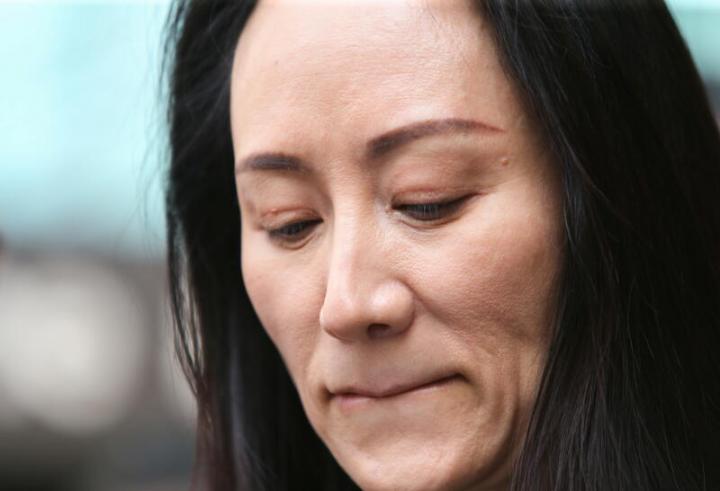
孟晚舟说,“过去三年中,我的生活天翻地覆,” “作为一位母亲,一位妻子,这对我来说是个破坏性的时期……但我相信每片乌云都有一线希望。这真的是我生命中的一次宝贵经历。我永远不会忘记从世界各地的人们那里收到的美好祝愿。”
她还补充说:“困难越大,成长就越大。”
孟晚舟于2018年12月1日在温哥华机场过境时被加拿大警方依据美国司法部的要求逮捕,当时美国指她在华为的伊朗业务问题上误导汇丰银行,导致汇丰违反美国对伊朗的制裁令,以此要求加拿大逮捕孟晚舟并引渡至美国。
加拿大司法部随后于2019年3月1日就孟晚舟引渡案签发授权进行令,开启了超过两年的案件审讯过程,也掀起中国与加拿大之间越演越烈的司法与外交博弈。
案件此次的进展将有望消除中美之间的一项主要争端,也有可能为中国释放两名被关押的加拿大公民铺平道路。
孟晚舟被捕后,加拿大原外交官康明凯(Michael Kovrig)和商人斯帕弗(Michael Spavor)同月因“涉嫌从事危害中国国家安全的活动”在中国被捕。
他们于今年3月在中国受审,中国法庭上个月判定斯帕弗犯为境外刺探、非法提供国家秘密罪,判处入狱11年,康明凯的案件则还未宣判。
加拿大法官終結引渡程序 釋放華為財務長孟晚舟
9/24/2021
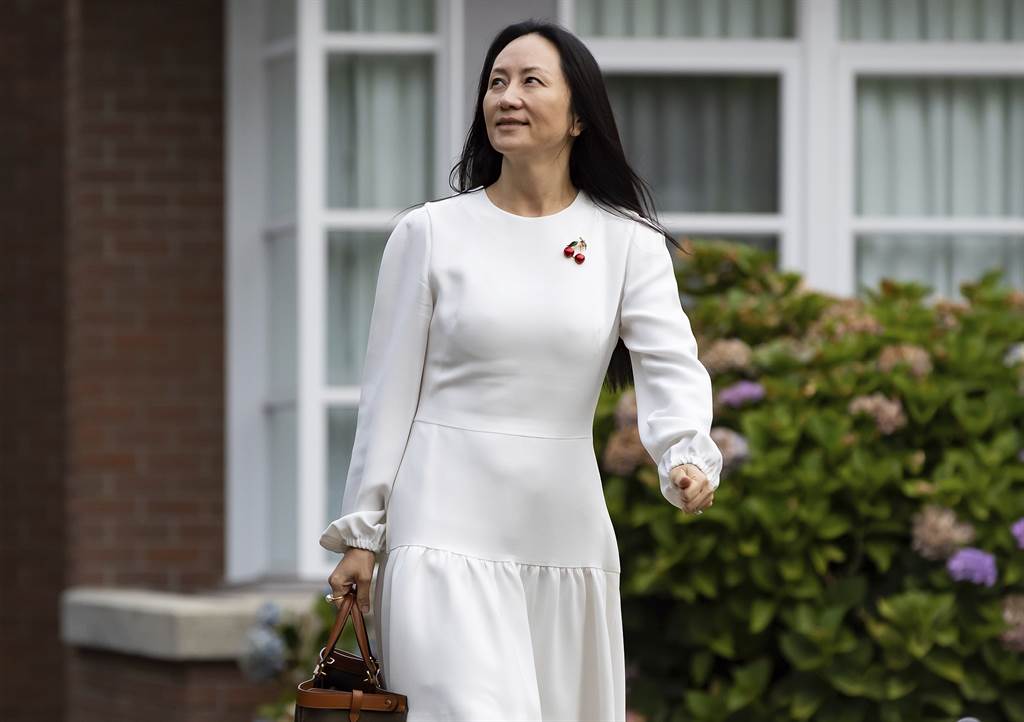
加拿大法官今天終結針對華為財務長孟晚舟的引渡程序,下令將她保釋條件解除並釋放她,結束近3年的法律攻防。
法新社報導,加拿大卑詩省最高法院副首席大法官福爾摩斯(Heather Holmes)做出這項裁判前,孟晚舟已與美國檢方達成緩起訴協議,避免詐欺重罪指控。
Canada, China and US were all doomed to lose in Meng Wanzhou’s case
Analysis: After the Huawei chief’s detention, the saga rapidly turned from a narrow legal dispute into an escalating battle
By Patrick Wintour
9/24/2021

The deal allowing Meng Wanzhou to return home to China nearly three years after her arrest will come as a relief to all the participants in a saga that rapidly turned from a narrow legal dispute into an escalating geopolitical battle.
After the Huawei finance chief was detained on a US warrant in Vancouver airport in December 2018, Canada, China and the US soon found themselves locked into a court case which they were all – at least in political terms – doomed to lose.
Meng’s case was never going to turn purely on the idiosyncrasies of Canadian extradition law or the frankness with which she had told Huawei’s bankers HSBC about the relationship between her company and a subsidiary accused of violating US sanctions against Iran.
For one thing, even though the justice department may have felt they were doggedly acting on information about a potential breach of US sanctions law, Donald Trump made the case explicitly political by saying he would intervene to drop the charges if he thought it would help US-China trade negotiations.
China, meanwhile, felt Meng and Huawei were being used as a weapon in a wider battle. It was highly unusual for the prosecution to be directed at the chief finance officer personally and not at the corporation. Last year, Airbus agreed to pay $4bn in penalties to resolve a bribery case. In 2015, Deutsche Bank was fined $258m for violating Iran- and Syria-related sanctions. But no executives were detained in either case.
Since Meng was the daughter of Huawei’s founder, Ren Zhengfei, this was viewed as a personal attack not just on the firm but on a business hero.
Beijing responded to her detention on three tracks.
Within days, the Chinese government detained two Canadians, former diplomat Michael Kovrig and entrepreneur Michael Spavor, on dubious charges. A Chinese court in August found Spavor guilty of espionage and sentenced him to 11 years in prison. He has appealed the ruling. The verdict for Kovrig has yet to be announced.
Second, Huawei prepared one of the most legally sophisticated, multi pronged and expensive court challenges to an extradition ever mounted – one that would likely have taken years to wind its way through the Canadian courts. After two years of hearings, the court was due to announce in October when it would rule on Meng’s extradition. The substantive hearing in the US – now cancelled – would have been equally drawn out.
Finally, the Chinese government made life as difficult as possible for Canada.
Caught between two superpowers and desperately aware of the need to display the independence of its courts, Canada has tried to avoid provocation. It still has not announced its decision on Huawei 5G or the on listing of China CGTN television network . Nor has it been at the forefront of those defending Taiwan from Chinese threats. It was not a member of the Aukus security pact announced this week. The emphasis has been on quiet diplomacy, and making clear through its declaration on arbitrary detention that state hostage taking is unacceptable – although even that prompted a furious reaction from Beijing.
So why has a settlement been reached now? The US justice department said the out-of-court settlement is not dissimilar to one discussed between the two sides last year. At the time Meng refused to make any admission of guilt at all. Since then she may have realised her chances of avoiding extradition were vanishingly small. The court’s room for discretion in extradition cases is low. The judge cannot hold a substantive trial of the charges just to test if the alleged crime would be considered illegal in Canada, and whether there had been abuse of process.
Meng may find this frustrating, given the evidence shown in court.
Her lawyers argued that internal HSBC emails and memos showed she had been upfront with senior HSBC staff about Huawei’s relationship with the subsidiary accused of sanctions-busting, Skycom.
Indeed, at a hearing in August, the judge in the case said that the case against Meng seemed very unusual. No one lost money, the allegations were several years old, and the intended victim, a global bank, knew the truth even as it was allegedly being lied to.
Heather Holmes, associate chief justice, asked: “Isn’t it unusual that one will see a fraud case with no actual harm many years later? And one in which the alleged victim, a large institution, appears to have had numerous people within the institution who had all the facts that are now said to be misrepresented?”
In reaching the out of court settlement the US may have acknowledged its case at trial was hardly watertight.
But the deal struck on Friday contains damning admissions by Meng that she had been knowingly untruthful in telling HSBC about the links between Huawei and its subsidiary operating in Iran. The DPA does not set out whether HSBC independently knew anyway about the degree of connection, merely that facts in the presentation were inaccurate.
Her return to China will come as a welcome gift to the re-elected Justin Trudeau – even if he still has to negotiate the release of the two Michaels.
快讯!美法官批准孟晚舟保释条件 撤销引渡要求
9/24/2021
香港01报道:华为副董事长孟晚舟9月24日出席美国法院的聆讯,并与美国检察部门达成协议,只要她在2022年12月之前没有违法,就可获当局撤销控罪。
目前身处加拿大温哥华的孟晚舟24日以视像方式,出席纽约联邦法院的聆讯。检察官凯斯勒(David Kessler)表示,孟晚舟获“延期起诉协议”(Deferred-Prosecution Agreement,DPA)直到2022年12月为止。
而作为协议一部分,她否认控罪。
布鲁克林(Brooklyn)地区法院法官唐纳利(Ann Donnelly)裁定,接受孟晚舟的延期起诉协议,批准她的具结保释条件。
检察部门同时称,华府会通知加拿大,美国撤销引渡孟晚舟的要求。温哥华卑诗省(British Columbia)法院将在同日较后时间举行引渡聆讯,预计她届时可以获释。
美国司法部之后发表声明,指孟晚舟承认就华为在伊朗的生意误导银行,并强调会继续准备对华为的官司,称期待在法庭上提出证据。
加拿大《环球邮报》曾在9月17日引述消息称,美国恢复与华为以及孟晚舟的代表律磋商延期起诉协议。内文称,美国司法部要求她认罪以及支付巨额罚款,以换取美国终止对她的引渡申请以及撤销刑事诉讼,她将可返回中国。
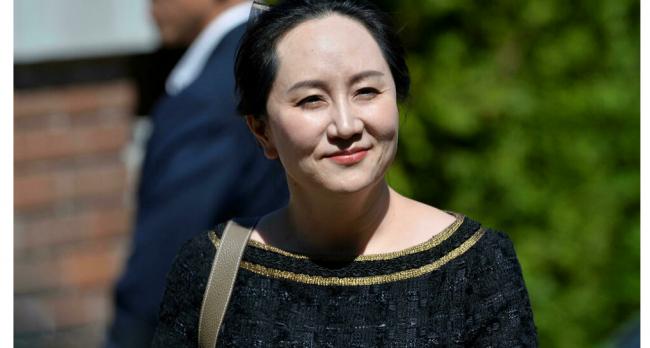
孟晚舟2018年12月在温哥华机场过境期间,加拿大当局应美国要求扣留对方。华府起诉孟晚舟电滙欺诈罪,指她涉嫌隐瞒公司与伊朗有生意往来,误导滙丰银行。她一直否认控罪。
Huawei CFO Meng Wanzhou to be released after agreement with U.S. in wire fraud case
By Lauren Feiner
9/24/2021
KEY POINTS
- Huawei CFO Meng Wanzhou will be released and allowed to return to China after reaching an agreement with the U.S. government charges of fraud.
- Meng, the daughter of the Chinese tech firm’s founder, was arrested in Canada in December 2018 as the U.S. sought to extradite her on bank and wire fraud charges.
- Meng pled not guilty to the charges on Friday but affirmed the accuracy of a statement of facts with the government’s claims.

Don MacKinnon | AFP | Getty Images
The chief financial officer of Chinese tech firm Huawei will be released and allowed to return to China after reaching an agreement with the U.S. government on fraud charges, prosecutors said Friday in a Brooklyn federal court.
A U.S. district judge accepted the deferred prosecution agreement, which will last until Dec. 1, 2022. Under the deal, the executive, Meng Wanzhou, affirmed the accuracy of a statement of facts and agreed not to commit other crimes, or risk prosecution.
Meng, the daughter of Huawei’s founder, was arrested in Canada in December 2018. The U.S. sought to extradite her on bank and wire fraud charges, claiming she was misled a financial institution to violate American sanctions on Iran. The U.S. said Friday it plans to withdraw its extradition request.
Meng pleaded not guilty to the charges on Friday. As part of the agreement, however, she took “responsibility for her principal role in perpetrating a scheme to defraud a global financial institution,” acting U.S. Attorney for the Eastern District of New York Nicole Boeckmann said in a statement.
According to Boeckmann, Meng admitted to making “multiple material misrepresentations” while CFO of Huawei about the company’s business in Iran, in conversations with the senior executive of a financial institution. The government claimed she did this to continue Huawei’s business relationship with the firm.
Boeckmann said the admission confirms the core allegations against Meng. Media reports have linked Hong Kong-based HSBC to the case, though the bank has previously said the DOJ has confirmed it is not under investigation in the case.
A Huawei spokesperson declined to comment.
A lawyer representing Meng said he was “pleased” with the agreement.
“She has not pleaded guilty and we fully expect the indictment will be dismissed with prejudice after fourteen months,” attorney William W. Taylor III said. “Now, she will be free to return home to be with her family.”
孟晚舟与美国司法部达成协议 有望离开加拿大
BBC NEWS
9/24/2021
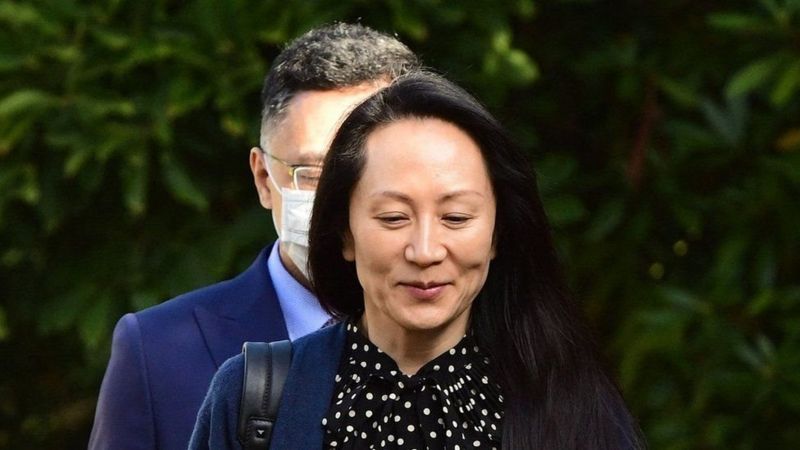
美国司法部与中国电信巨头前任CFO孟晚舟达成暂缓起诉协议。最新进展为孟晚舟离开加拿大、返回中国铺平道路。
孟晚舟周五(24日)当地时间下午通过视频在纽约布鲁克林联邦法庭出庭。孟晚舟对多项银行欺诈指控表示不认罪;作为协议的一部分,她承认曾向银行作假、帮助华为破坏了针对伊朗的经济制裁。
按照美国司法部和孟晚舟达成的暂缓起诉协议,美国将在明年12月、也就是孟晚舟被捕四年后撤销针对她的指控,前提是她满足法庭设定的某些条件。
多家媒体报道称,接下来,美国司法部将通知加拿大,撤回引渡请求。
据报,加拿大法庭定将在同天晚些时候举行有关引渡的听证。
孟晚舟于2018年12月过境加拿大时在温哥华国际机场被捕。
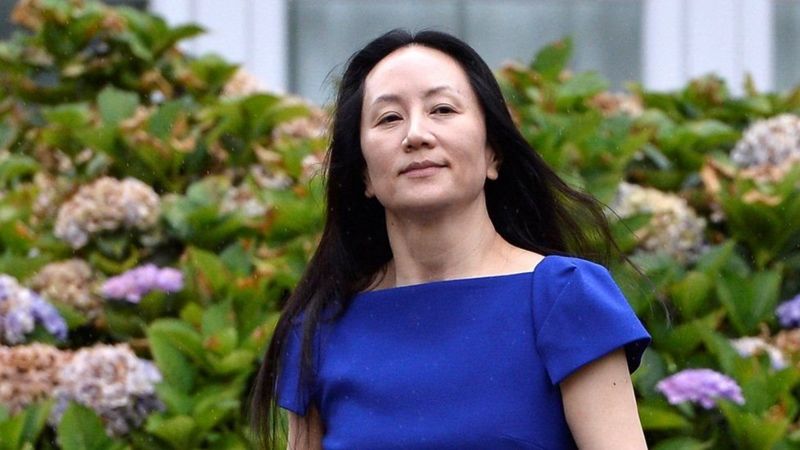
美国指控孟晚舟隐瞒华为香港子公司星通(Skycom)与伊朗的业务往来,违反美国制裁伊朗的规定。美方又称,这一行为还涉嫌诈欺汇丰银行,让后者也承受违反制裁规定的风险。
美方因此寻求引渡孟晚舟到美国受审。
自从在温哥华机场被捕以来,孟晚舟滞留在加拿大,处于美加引渡听证流程中。
孟晚舟一直坚称无罪。
孟晚舟是中国电信巨头华为创始人任正非的女儿。知名中国企业的高管应美国要求在加拿大被捕,在中国引起轩然大波。
此后,孟晚舟案一直是中美关系的诸多绊脚石之一。案件亦引发了中国和加拿大之间的一场外交危机,两名加拿大公民随即在中国被指控、以危害中国国家安全罪名被捕。
美国制造业为何会衰落
来源:中评社
7/08/2021
美国历届政府高度重视制造业,不仅提出“再工业化”的口号,而且要振兴美国的制造业。美国总统之所以提出这样的经济政策,是因为美国经济进入后工业化时代之后,面临问题越来越多。资本市场凯歌高奏,可是,制造业却日趋萧条。金融行业就业人数有限,为了解决就业问题,必须重新回到工业化时代,建立完整的产业链。
可是,美国已经回不去了。1953年美国制造业在国内生产总值中所占的比重高达28.1%,可是到2020年,制造业在美国国内生产总值中所占的比重只有10.8%。
制造业对美国经济的贡献率越来越小。正是由于看到了这一点,2016年美国共和党总统候选人特朗普把竞选重点放在美国中西部地区,争取美国中西部地区失业人口的支持。事实证明,这样的竞选策略非常正确。
可是,赢得大选入主白宫之后,特朗普总统并没有改变美国的经济格局。虽然美国白宫经济顾问中不乏经济专家,但是,那些来自美国华尔街的金融专家,与美国总统的执政理念格格不入,因此,他们不得不挂冠而去。
为了兑现自己的政治承诺,这位美国华盛顿的“闯入者”,聘请一些极右翼的政客制定经济政策,通过发动贸易战争,实行贸易保护主义,保护本国市场,试图恢复美国的经济结构。可是,现在看来,四年执政期间,由于对所有贸易伙伴发动贸易战争,结果导致美国的经济结构遭到严重破坏。
现在美国许多企业不得不通过间接的方式从中国进口商品。一些企业甚至公然拒绝执行美国白宫的经济政策。可以这样说,美国重振制造业计划,注定不能成功。
首先,美国是一个典型的资本主义国家,资本趋利性决定了,投资者为了获取更多的利润,一定会将资金转移到其他国家。美国许多制造企业为了减少成本,提高利润率,将设计和市场营销环节牢牢地控制在自己的手中,可是,将加工制造业转移到国外。这样做的结果是,美国逐渐失去产业链,重要零部件的供应体系彻底破坏,美国在工业制造领域,失去了竞争力。
现在许多国家特别是新兴市场经济国家制造的产品在美国市场销售,而美国企业生产的产品已经很难与之竞争。美国实行贸易保护主义,试图保护本国市场,可是,这样做除了增加美国进口商和美国消费者的负担之外,没有其他的结果。
其次,美国试图依靠自己的金融霸权,改变经济结构,但是,回天乏力。上个世纪80年代,日本向美国出口半导体产品,日本汽车几乎占据美国汽车市场的半壁江山。为了阻止日本向美国出口大宗商品,美国联合其他国家迫使日本签订“广场协议”,并且对日本出口美国的半导体产品增加征收惩罚性关税。
为了解决国内半导体产品需求,美国转而扶持韩国生产半导体产品,从而形成了如今韩国的半导体产品和日本的半导体产品在国际市场上并驾齐驱的局面。美国认为只要对中国采取同样措施,即可迫使中国乖乖就范。可是,美国总统没有意识到,中国是一个主权独立国家,拥有自己的经济主权和经济发展规划,绝对不会允许美国干涉中国的经济发展方向,美国总统对中国发动的贸易战争没有达到预期的效果。

Tel: 551-580-4856 | Email: F.WINNIE.S@GMAIL.COM
既不能阻止中国产品源源不断地出口美国,同时也无法吸引更多的投资者,美国经济陷入进退维谷两难境地。美国总统采取的策略是,通过基础设施建设规划,解决美国经济发展中存在的问题,试图依靠基础设施建设拉动的内部需求。
这当然是一个非常重要的方法。但必须指出的是,对于美国这样一个国家,既得利益集团相互掣肘,美国基础设施建设计划能否如期进行,这本身就是一个值得讨论的问题。当初美国奥巴马总统决定修建高速铁路,可是,加利福尼亚州的高速铁路建设规划根本无法落到实处。美国联邦政府的补贴资金,早已经不复存在,可到目前为止,美国仍然没有建成高速铁路网络。高速铁路建设,需要征地拆迁,需要协调各方面的立场,从目前的情况来看,美国民主党总统似乎缺乏信心,因此,没有重新提出修建高速铁路的计划,而是要在原有设施基础之上,实施维修工程。而这样做究竟会让多少既得利益集团中饱私囊,人们不得而知。
第三,制造业是工业化核心,制造业也是工业化的象征。工业化既包括制造业,还包括农业工业化。美国在农业生产方面,已经实现机械化或者工业化。可是,美国在制造业领域,要想实现工业化,面临许多困难。
究其原因就在于,美国幅员辽阔,但是,人口相对较少,城市化建设过程中,美国面临巨大的成本。美国围绕着东部大湾区建设金融中心,围绕着旧金山建设西部科技创新中心,可是,除了这两个地方之外,其他地区的发展都面临严重困难。堪萨斯州是美国的能源中心,而中部地区是美国的农业中心,到目前为止,美国尚未形成一个类似于东京湾那样的大规模制造中心。
中国已经在珠江三角洲地区,建设一个规模巨大的科技创新制造中心。未来中国有可能会在杭州湾建设世界上规模最大的制造中心。美国重新回到工业制造业领域,与中国竞争,不是扬长避短,而是扬短避长。可以毫不客气地说,美国在制造业领域毫无竞争优势。
中国作为世界第二大经济体,之所以能够快速发展,得益于中国的制造业形成规模效应。珠江三角洲地区,是中国现代制造业的发源地。长江三角洲地区,是中国民族制造业的发源地。渤海湾地区,是中国能源原材料的集散地。中国渤海湾地区,不仅拥有河北秦皇岛这样的大型煤炭港口,而且拥有大连、烟台、青岛、天津、北京这样著名的科技创新城市。如果中国从南到北,形成珠江三角洲制造业中心、长江三角洲制造业中心、渤海湾制造业中心,那么,中国的制造业将会傲视全球。
中国已经成为世界上最大的制造业中心。中国不仅拥有完整的工业门类体系,而且更重要的是,中国形成了“产学研”一体化的制造基地。中国选择轮轨高速铁路系统,为了降低能耗,提高铁路的运营效率,中国铁路装备制造企业与中国交通高等院校合作,研制新一代的材料和技术,从而使中国轮轨高速铁路能够达到每小时400公里,节约能耗10%。这标志着中国在高速铁路领域,已经掌握世界先进技术。任何国家要想与中国开展竞争,将会面临巨大挑战。
可是,美国却不一样。美国依托高等院校建立“硅谷”,形成了以网络技术为代表的科技产业体系,可是,美国网络科技产业体系在国际竞争中,遇到了越来越多的麻烦。美国网络平台企业被许多国家反垄断机构调查,美国在网络经济发展中,面临越来越多的瓶颈制约因素。
美国试图依靠自己所掌握的金融垄断体系和金融信息,发展美国的数字经济。可是,越来越多的国家意识到,美国已经或者可能损害他们的合法权益,因此,他们积极寻求摆脱对美国的金融依赖,依靠科技创新,发行数字货币,走独立自主的数字经济发展道路。美国在数字经济发展中面临重大发展。
正是由于看到的美国在网络经济、数字经济发展中所面临的问题,美国历届政府才会提出重新回到工业化,试图在工业制造领域,与其他国家竞争。这是典型的开历史倒车,美国将会付出巨大的代价。
美国民主党政府并非不了解美国所面临的困境,可是,美国民主党政府不愿意让美国民众看到事实的真相,因此,他们千方百计地转移视线,掩盖真相,试图把美国国内问题变成其他国家的问题。美国把中国作为主要战略对手,通过各种方式,阻碍中国的发展。但是现在看来,无论是利用中国的台湾问题给中国制造麻烦,还是在国际社会组建联合抵制中国的战略同盟,都无法达到预期的效果。
美国重返制造业,从逻辑上来说是可行的,但是,世界不会等待美国重新回到过去。面对越来越激烈的竞争,美国似乎无所适从。现在美国唯一的优势是金融体系,美国信用经济确保美国拥有足够的资金,可以实行赤字财政。可是,如果其他国家意识到美国经济存在的问题,拒绝向美国输送商业利益,那么,美国经济还能持续发展下去吗?
中国一些经济学者认为,不要认为美国经济日趋衰落,美国仍然是世界上最强大的经济体。中国应当加强与美国的经济合作,保持与美国的经济联系。正是由于对美国经济发展前景感到乐观,认为中国必须帮助美国克服困难,他们才会提出应当购买美国国债,支持美国经济转型。
然而,无论是美国华盛顿的政客还是美国的企业家,对美国是否偿还中国的债务,始终态度鲜明。美国从来不打算偿还中国的债务。中国购买美国国债,是典型的自虐行为。中国当然需要美元外汇储备,这是中国作为世界大国必要的信用安排。但是,中国在任何情况下都不能把希望寄托在美国经济复苏之上,美国经济转型不可能成功。尽管美国可以继续利用自己的金融霸权,从世界各地掠夺财富,但这只不过是历史的回光返照,如此而已。
总而言之,美国制造业的衰落,是源于美国资本主义的贪婪性,源于美国霸权主义的掠夺性,源于美国国内的政治纷争。美国模式不可复制,经济制度是如此,政治制度也是如此。
温铁军:美国用了二十年,打造了收割全球的金融利器
7/07/2021
温铁军 是中国人民大学可持续发展高等研究院院长、《中国改革》、《改革内参》杂志社社长兼总编,知名农业专家。
Jul 4, 2021
Mar 6, 2021
Feb 20, 2021
金融筑牢大国博弈之盾
By 杜善凡
7/07/2021
从15世纪开始,起源于欧洲的地理大发现带来了大航海时代,此后的几百年时间里,世界经济在全球化的进程中曲折前行,而金融伴随着贸易全球化也渗透到世界各个角落,金融全球化势不可挡。

金融是“收割”全球财富的利器
金融全球化除了给世界各国带来贸易便利,给实体经济带来资金以外,也成了全球经济周期性危机的爆发点。尤其是最近的1997年亚洲金融风暴和2008年美国次贷危机引发的全球性金融海啸,均是以金融系统的崩溃为导火索,再蔓延到整个实体经济。
每次金融危机都是对全球财富的再分配。南美和东南亚一些国家和居民在过去十几年甚至是几十年中积累的财富在极短时间内归零,更有甚者背负上巨额债务。然而,在财富的重新洗牌中,掌握着流通货币“闸门”的国家和金融大鳄从中渔利,形成了对遭遇金融危机国家和居民财富的收割。这也是这些国家经济长期徘徊不前和低迷的原因之一。
新冠肺炎疫情这只“黑天鹅”对全球经济的侵蚀以金融市场的动荡为开始标志。各国为了救济经济,启动“印钞机”。根据IMF数据,截至2020年底全球主要十二大经济体,货币总供应量已经高达近100万亿美元。疯狂印钞背后是资产价格的飙升,全球股市、楼市、大宗商品、比特币等,几乎都创下了新高,居民生活成本飙升。曾经是南美最富裕的阿根廷在去年4月份疫情的首轮打击下就宣布外债违约,无力偿还;2021年初巴西在疫情和外债的双重打击下宣布政府破产;今年4月初,土耳其货币里拉崩盘。压死这些国家的最后一根稻草是什么?答案就是货币大幅贬值,直至失去法定货币的地位,这也是金融全球化给一国金融体系带来的摧毁性的打击。

中国免于被“收割”
保障金融安全,金融制度是外部之盾,而能够抵御深度冲击的更坚固的护城河则是内在经济的健康稳健运行。对于中国来说,免于两次金融危机带来的财富大洗劫最大的防护之盾是中国没有开放资本项下的自由兑换,相反南美和东南亚一些国家都是因为资本的可自由兑换,给了外资机构在外汇市场和股市进行操控的机会。资本大鳄为什么盯住东南亚和南美这些国家作为做空目标呢?深层次的原因还在于这些国家经济由于货币超发带来经济过热,出现了巨大的资产价格泡沫。股市、楼市、商品价格在外资大量涌入的情况下不断上涨,而当外资机构抛售本币计价的货币资产时,就会导致价格大幅下跌,在金融市场的表现就是股市大跌、汇市被做空、债市被做空,因为这种情况下,经济发展没有后劲,对未来的股市、债市和汇市全部看空。
中国从改革开放以来逐步融入世界经济,同样经历了两次金融风暴,但是中国的国内生产总值却从1997年的7.97万亿元增加到2020年的100万亿元,实现了11.5倍的增长。在亚洲金融风暴前的1996年,泰国的人均GDP是中国的4倍,2019年新冠肺炎疫情之前泰国的人均GDP仅达到中国的80%,可以说1997年的金融风暴让泰国的经济倒退了20年。相反,中国在此后的20-30年时间里,经济突飞猛进增长,持续保持全球最快的增速,这成为西方经济学界研究的课题,称为“中国发展奇迹”。
创造中国发展奇迹的力量是什么?这就要看每次危机背后,中国是如何推动经济逆势起飞。
其实在1997年亚洲金融风暴的时候,中国经济从高热变成平稳后,即所称的“软着陆”,马上进入了急剧的下滑。外贸乏力、内需不足、产能过剩、国有企业亏损、银行呆账坏账严重是当时经济面临的困境。由于之前经济过热而扩张的产能无法得到释放,造成高投入低产出低回报,财政金融形势非常不乐观。在这种情况下,中央做出决定——发展基础设施建设。首先是发行特别国债以补充商业银行资本金,半年后财政部再次增发1000亿元长期国债,分两年列入国家预算,此后追加到2000多亿,加上配套资金高达6000亿,主要用于支持东南沿海的基础设施建设。大量的高速公路开始修建,如今东部地区纵横交错的高速公路网络,就是成型于这一时期。大量的政府投资,直接驱动经济向前狂奔。而基础设施的大量建设反过来又促进了实体经济的快速增长。到2000年11月,当时的国家经贸委宣布,中国国有企业“三年脱困”目标顺利完成。三年后的中国,开始进入一个新的增长周期,此后的十年间,平均经济增速在10%以上。在2000年的时候中国高速总里程是1.63万公里,如今20年过去了,中国的高速公路里程达到了15万公里。
在这20年时间里,中国高速公路里程增加了近10倍,而中国的GDP却是实实在在的翻了不止10倍。强大的交通基建提升了中国经济社会发展速度,而强大的经济实力也在加速中国基础设施建设,两者形成相互促进的效果。其中以政府债务为基础的金融支持是中国基建能够造就中国速度的首要“功臣”。以国债、政策性金融债、政府产业基金等形式的各类投融资形式成为中国经济发展的“推进器”,这也就是政信金融的重要价值体现。
同样,在全球遭遇2009年美国次贷危机引发的金融海啸后,中国做出大规模基建计划,在全球经济低迷甚至下滑的情况下,中国在2010年的GDP达到59万亿元,超过曾经排名第二的日本成为世界第二大经济体。在这十年内,以高速铁路、高速公路、机场为代表的基建设施建设如火如荼推进,中国经济增长也成为带动世界经济增长的引擎。基建成长背后是中国制造的支撑,也让全世界更加深刻认识到“made in China”的威力。曾经依赖高价进口的基建设备居然也能成为出口创汇的来源,这得益于为满足大基建而打造的“重器”。这一阶段的基础设施建设的投融资形式更加多样化,不仅有国债、政策性金融债券的低息长期投入,而且增加了众多地方融资平台为地方基础设施建设筹措资金,通过发行信托,吸纳保险、社保等资金进入到基建中,为建设提速,扩大了规模。正是因为有政信金融参与其中,现在我们才能实现“坐高铁游遍中国”的愿望。
2020年的新冠肺炎疫情给世界经济带来了“急刹车”,世界很多人民因疫情陷入贫困,然而中国却向全世界宣布实现了全面脱贫,提前10年完成了联合国制定的减贫计划。中国33年(1987年提出扶贫攻坚计划到2020年全面脱贫)减贫脱贫路是伴随着从东到西的基础设施建设而来。基础设施建设的经济效益不是能用简单的数字来衡量的。

筑牢大国金融博弈之盾
人类进入工业文明以来,历次工业技术的革命都是重塑国际格局的时机,也是规则重新制定的时机。第四次工业革命即数字化时代已经来临,唯有下得先手棋才能在新的竞争格局和规则制定中占得先机。
在金融全球化的今天,金融越来越成为国际竞争博弈的“大杀器”,金融是收割全球财富的利器。2020年全球金融市场注入的巨大流动性将会给不同的国家带来哪些影响?如今我们已经看到国际原材料价格暴涨、资本市场不断冲高,在不可预见的新一轮经济周期来临之前,要避免成为全球金融链条上薄弱的一环,中国该如何应对?
答案可以在2020年新冠肺炎疫情之初在各省的发展规划和《中华人民共和国国民经济和社会发展第十四个五年规划和2035年远景目标纲要》里找到:
一是区域经济协调发展,主要是都市圈、城市群的打造,并辐射周边经济,东中西部产业联动,智慧城市建设,打造宜居宜业的生产生活环境,资源互补,协调发展;5G通讯设备的铺设,工业互联网的推广应用等。
二是新型城镇化和乡村振兴,相关投入包括健康、养老、市政等公共服务设施的完善。
三是国家综合立体交通网的建设,相关投入包括高铁、轨道交通、机场建设等。
四是碳达峰和碳中和,如特高压、新能源、新材料、传统能源企业的节能环保技术改造投入等等。
这些背后是国家继“十三五”在基建方面的投资的新一轮建设升级,这些升级为中国在下一阶段(2020-2050)的发展提供基础。
在“十四五”期间,投融资机制将在吸收“十三五”投融资创新经验的基础上更加高效、科学,平衡债务与经济效益的关系,更广泛地调动各类社会资本参与基础设施的发展,将居民的高储蓄转化为国家建设资金,让全民共享到经济发展的红利,让政府的投融资成为普惠全民的机会,从而形成金融体系的内循环。
大国博弈具有长期性,中国的发展同样是势不可挡。在全球重塑经济格局和金融格局过程中,政府投融资机制将成为大国博弈之盾。
* 本文已刊登于中华人民共和国财政部主管的《新理财》杂志2021年5月刊(总第358期),由政信投资集团与杂志社共同撰稿。作者杜善凡系中国政信研究院高级研究员。
China beating US by being more like America
Cultivating human capital will be essential if the US rather than China is to be the base of the next industrial revolution
By BRANDON J WEICHERT
4/25/2021
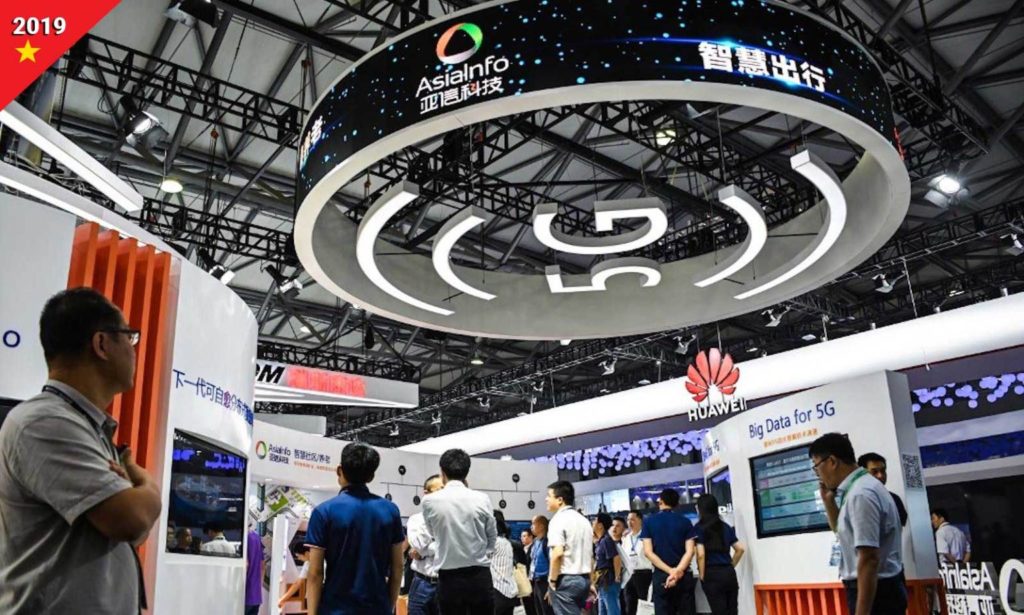
The United States transitioned from an agrarian backwater into an industrialized superstate in a rapid timeframe. One of the most decisive men in America’s industrialization was Samuel Slater.
As a young man, Slater worked in Britain’s advanced textile mills. He chafed under Britain’s rigid class system, believing he was being held back. So he moved to Rhode Island.
Once in America, Slater built the country’s first factory based entirely on that which he had learned from working in England’s textile mills – violating a British law that forbade its citizens from proliferating advanced British textile production to other countries.
Samuel Slater is still revered in the United States as the “Father of the American Factory System.” In Britain, if he is remembered at all, he is known by the epithet of “Slater the Traitor.”
After all, Samuel Slater engaged in what might today be referred to as “industrial espionage.” Without Slater, the United States would likely not have risen to become the industrial challenger to British imperial might that it did in the 19th century. Even if America had evolved to challenge British power without Slater’s help, it is likely the process would have taken longer than it actually did.
Many British leaders at the time likely dismissed Slater’s actions as little more than a nuisance. The Americans had not achieved anything unique. They were merely imitating their far more innovative cousins in Britain.
As the works of Oded Shenkar have proved, however, if given enough time, annoying imitators can become dynamic innovators. The British learned this lesson the hard way. America today appears intent on learning a similar hard truth … this time from China.
By the mid-20th century, the latent industrial power of the United States had been unleashed as the European empires, and eventually the British-led world order, collapsed under their own weight. America had built out its own industrial base and was waiting in the geopolitical wings to replace British power – which, of course, it did.
Few today think of Britain as anything more than a middle power in the US-dominated world order. This came about only because of the careful industrial and manipulative trade practices of American statesmen throughout the 19th and first half of the 20th century employed against British power.
The People’s Republic of China, like the United States of yesteryear with the British Empire, enjoys a strong trading relationship with the dominant power of the day. China has also free-ridden on the security guarantees of the dominant power, the United States.
The Americans are exhausting themselves while China grows stronger. Like the US in the previous century, inevitably, China will displace the dominant power through simple attrition in the non-military realm.
Many Americans reading this might be shocked to learn that China is not just the land of sweatshops and cheap knockoffs – any more than the United States of previous centuries was only the home of chattel slavery and King Cotton. China, like America, is a dynamic nation of economic activity and technological progress.
While the Chinese do imitate their innovative American competitors, China does this not because the country is incapable of innovating on its own. It’s just easier to imitate effective ideas produced by America, lowering China’s research and development costs. Plus, China’s industrial capacity allows the country to produce more goods than America – just as America had done to Britain
Once China quickly acquires advanced technology, capabilities, and capital from the West, Chinese firms then spin off those imitations and begin innovating. This is why China is challenging the West in quantum computing technology, biotech, space technologies, nanotechnology, 5G, artificial intelligence, and an assortment of other advanced technologies that constitute the Fourth Industrial Revolution.
Why reinvent the wheel when you can focus on making cheaper cars and better roads?
Since China opened itself up to the United States in the 1970s, American versions of Samuel Slater have flocked to China, taking with them the innovations, industries, and job offerings that would have gone to Americans had Washington never embraced Beijing.
America must simply make itself more attractive than China is to talent and capital. It must create a regulatory and tax system that is more competitive than China’s. Then Washington must seriously invest in federal R&D programs as well as dynamic infrastructure to support those programs.
As one chief executive of a Fortune 500 company told me in 2018, “If we don’t do business in China, our competitors will.”
Meanwhile, Americans must look at effective education as a national-security imperative. If we are living in a global, knowledge-based economy, then it stands to reason Americans will need greater knowledge to thrive. Therefore, cultivating human capital will be essential if America rather than China is to be the base of the next industrial revolution.
Besides, smart bombs are useless without smart people.
These are all things that the United States understood in centuries past. America bested the British Empire and replaced it as the world hegemon using these strategies. When the Soviet Union challenged America’s dominance, the US replicated the successful strategies it had used against Britain’s empire.
Self-reliance and individual innovativeness coupled with public- and private-sector cooperation catapulted the Americans ahead of their rivals. It’s why Samuel Slater fled to the nascent United States rather than staying in England.
America is losing the great competition for the 21st century because it has suffered historical amnesia. Its leaders, Democrats and Republicans alike, as well as its corporate tycoons and its people must recover the lost memory – before China cements its position as the world’s hegemon.
The greatest tragedy of all is that America has all of the tools it needs to succeed. All it needs to do is be more like it used to be in the past. To do that, competent and inspiring leadership is required. And that may prove to be the most destructive thing for America in the competition to win the 21st century.
Source: https://asiatimes.com/2021/04/china-beating-us-by-being-more-like-america/
Feb 18, 2021
Aug 4, 2020




